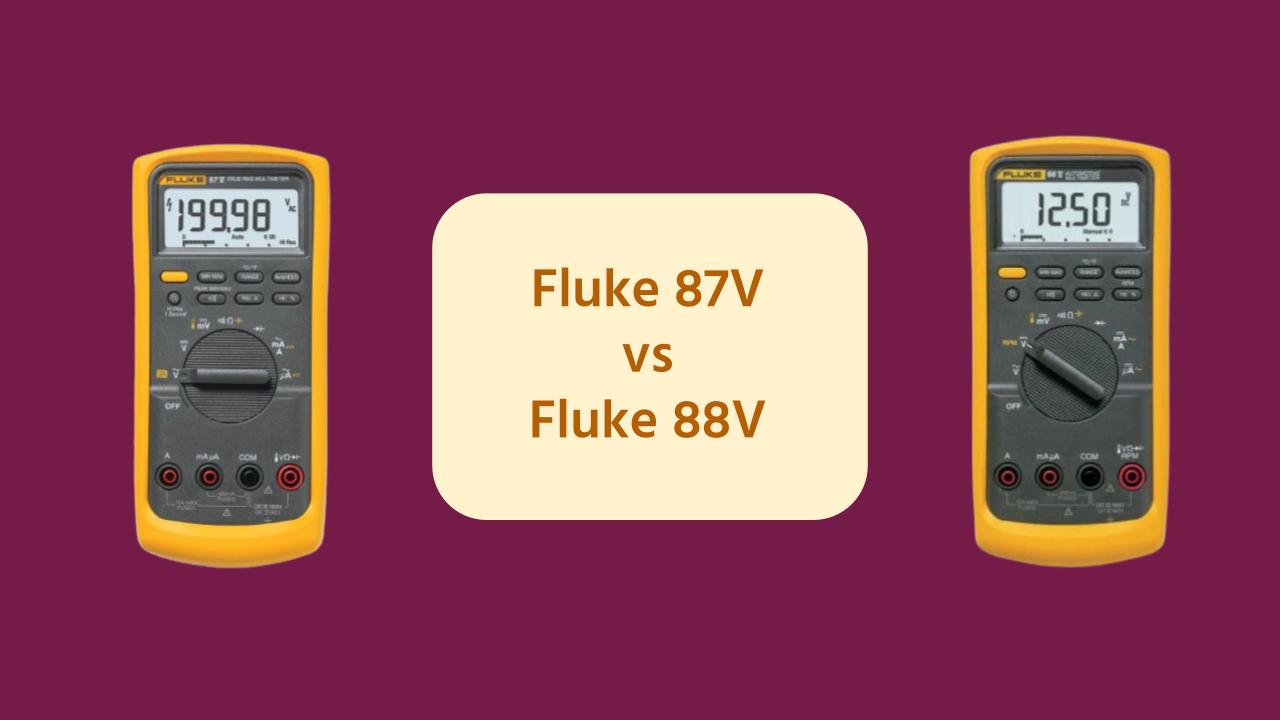Similar in product numbers, the two Fluke multimeters are quite dissimilar and therefore intended for different applications.
Fluke 87V is a better pick If you work with high-frequency electronics, motors, and complex electrical systems. For automotive applications, the Fluke 88V is a better option.
🏷️ Fluke Multimeter Deals ⭐⭐⭐⭐⭐
In this post we present a detailed comparison between the two meters.
Table of Contents
Fluke 87V Vs. Fluke 88V: Comparison Table
| Specification | Fluke 87V | Fluke 88V |
|---|---|---|
| 💳 Price | Check Price | Check Price |
| Voltage Measurement | Up to 1000V AC/DC | Up to 1000V AC/DC |
| Current Measurement | Up to 10A AC/DC | Up to 10A AC/DC |
| Resistance Measurement | Up to 50 MΩ | Up to 50 MΩ |
| Capacitance Measurement | Up to 9,999 μF | Up to 9,999 μF |
| Frequency Measurement | 200 kHz | 200 kHz |
| Continuity Check/Diode test | Yes | Yes |
| RPM | No | Yes ✅ |
| Conductance | 60 nS | 60 nS |
| Wide Bandwidth | 20 kHz ✅ | 5 kHz |
| True RMS Reading | Yes ✅ | No |
| Temperature Measurement | -200°C to 1090°C | -200°C to 1090°C |
| Fast Min/Max | Yes ✅ 250 us | No |
| Motor Drive Measurement | Yes ✅ | No |
| Backlight | Yes | Yes |
| Weight | 355 grams 624 grams (with holster) | 624 grams |
| Dimensions | 201 x 98 x 52 mm (with holster) | 206 x 98 x 52mm |
| Safety Rating | CAT III 1000V CAT IV 600V | CAT III 1000V CAT IV 600V |
| Auto Ranging | Yes | Yes |
| Removable Holster | Yes | Yes |
| Display | 20,000 counts | 20,000 counts |
| Analog Bar Graph | Yes | Yes |
Key Differences between the Fluke 87V and 88V
- Wide Bandwidth: Compared to Fluke 88 V, which has a bandwidth of 5 kHz, Fluke 87V, which has a bandwidth of 20 kHz, performs noticeably better at measuring AC signals across a more comprehensive frequency range. As a result, Fluke 87V is more versatile and reliable for applications involving higher frequency signals, ensuring greater accuracy in complex or high-speed electronic circuits.
🏷️ Fluke Multimeter Deals ⭐⭐⭐⭐⭐
- True RMS Reading: For AC measurements, Fluke 87V provides True RMS readings, which give more precise and trustworthy results, mainly when working with non-sinusoidal or distorted waveforms. Fluke 88V, however, does not have this feature.
- Motor Drive Measurement: Fluke 87V has a motor drive measurement feature that allows precise and efficient testing of motors and related equipment. Fluke 88V doesn’t offer thi feature. So, if you are an engineer, technician, or a hobbyist working with electrical equipment involving motors, 87V might be your pick.
- RPM: The Fluke 88V offers an RPM measurement feature. This capability allows for precise and efficient testing of rotational speed, making it a valuable tool for engineers, technicians, and maintenance professionals working with machinery and equipment that involve rotating components. Fluke 87V doesn’t have this feature.
- Fast Min/Max: The Fluke 87V offers a Fast Min/Max feature with a value of 250µs. This feature enables more precise and rapid measurement of minimum and maximum values. This feature helps capture transient signals and dynamic changes in electrical parameters, which is particularly valuable in troubleshooting and analyzing complex electrical systems.
Summary
Choose the Fluke 87V multimeter if you need to measure AC signals over a wide frequency range, require True RMS readings, need to test motor drives, or require fast Min/Max measurements. This model is ideal for professionals working with high-frequency electronics, motors, and complex electrical systems.
Choose the Fluke 88V if you need to work in the Automotive industry. This model is better suited for machinery and equipment that include rotating components.
🏷️ Fluke Multimeter Deals ⭐⭐⭐⭐⭐



